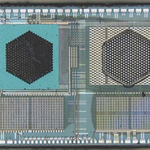Avicena demonstrates first microLED based Transceiver IC in 16nm finFET CMOS for chip-to-chip communications at ECOC 2023

Avicena is showing the first 1Tbps microLED-based Transceiver IC in 16nm finFET CMOS as part of its LightBundleTM multi-Terabit interconnect technology
SUNNYVALE, Calif. & GLASGOW, Scotland–(BUSINESS WIRE)–#innovation–Avicena, a privately held company headquartered in Sunnyvale, CA, is demonstrating its LightBundleTM multi-Tbps chip-to-chip interconnect technology at the European Conference for Optical Communications (ECOC) 2023 in Glasgow, Scotland (https://www.ecocexhibition.com/). Avicena’s microLED-based LightBundle architecture breaks new ground by unlocking the performance of processors, memory and sensors, removing key bandwidth and proximity constraints while simultaneously offering class leading energy efficiency.
LightBundle ASIC in 16nm finFET CMOS with transferred µLED and PD array and parallel electrical interface
Artificial intelligence (AI) is driving an unprecedented surge in demand for compute and memory performance, driven by applications like ChatGPT based on large language models (LLMs). These sophisticated models have an insatiable appetite for computing power and fast memory access, resulting in an urgent and growing demand for much higher-density, low-power interconnects between Graphics Processing Units (GPUs) and high-bandwidth memory (HBM) modules. Today, HBM modules must be co-packaged with GPUs because the GPU-memory electrical interconnect is limited to just a few millimeters in length. Conventional optical interconnects based on VCSELs or Silicon Photonics (SiPh) promise to extend the interconnect reach. However, they are challenged by the power, bandwidth density, latency, and cost requirements. By contrast, Avicena’s microLED-based LightBundle interconnects provide much lower power and latency, much higher bandwidth density, and can achieve very low costs.
“As generative AI continues to evolve, the role of high bandwidth-density, low-power and low latency interconnects between xPUs and HBM modules cannot be overstated”, says Chris Pfistner, VP Sales & Marketing of Avicena. “Avicena’s innovative LightBundle interconnects have the potential to fundamentally change the way processors connect to each other and to memory because their inherent parallelism is well-matched to the internal wide and slow bus architecture within ICs. With a roadmap to multi-terabit per second capacity and sub-pJ/bit efficiency these interconnects are poised to enable the next era of AI innovation, paving the way for even more capable models and a wide range of AI applications that will shape the future.”
About the Technology
Today’s high-performance ICs use SerDes-based electrical interfaces to achieve adequate off-chip density. However, the power consumption and bandwidth density of these electrical links degrade quickly with length. Conventional optical communications technologies developed for networking applications have been impractical for inter-processor and processor-memory interconnects due to their low bandwidth density, high power consumption, and high cost. The typical need for external laser sources (ELS) with SiPh increases complexity and cost. By contrast the LightBundleTM interconnect architecture is based on arrays of innovative GaN microLEDs that leverage the microLED display ecosystem and can be integrated directly onto high performance CMOS ICs. Each microLED array is connected via a multi-core fiber cable to a matching array of CMOS-compatible PDs.
“We have previously demonstrated microLEDs transmitting at > 10Gbps per lane and a test ASIC in a 130nm CMOS process running 32 lanes at less than 1pJ/bit,” says Bardia Pezeshki, founder and CEO of Avicena. “Now we are bringing up our first ASIC in a 16nm finFET process with over 300 lanes and an aggregate bandwidth of over 1Tbps bi-directional at 4Gbps per lane. The ASIC measures less than 12mm2 and contains the circuitry for the optical Tx and Rx arrays, as well as a high-speed parallel electrical interface and various DFT/DFM functions like BERT, loopbacks, and Open Eye Monitoring (OEM). All key ASIC functionality has been verified and we are currently working on yield improvements for manufacturing scalability.”
In the future the modular nature of the LightBundle platform will enable interconnects with high-bandwidth density of multi-Tbps per mm2 in advanced CMOS process nodes. The low power, high density, and low latency of LightBundle is well matched to chiplet interfaces like UCIe, OpenHBI, and BoW, and can also be used to enhance system architectures that are limited by the reach of existing compute interconnects like PCIe/CXL, and HBM/DDR/GDDR memory links.
Avicena at ECOC 2023:
In addition to showing the LightBundleTM technology at the ECOC exhibits (booth #522) Avicena will also present at the following event:
Session Time: October 4, 2023, 10:40 – 10:55
Session Title: Alasdair Fikouras, Sr. Process Development Engineer, will give a talk in Market Focus on:
High-speed, low power microLEDs for optical communications
About Avicena
Avicena Tech Corp. is a privately held company located in Sunnyvale, CA, developing LightBundle, a next generation optical interconnect architecture for AI/ML, HPC, sensors, 5G wireless and aerospace applications. This unique, flexible ultra-low energy technology is based on microLEDs, offering both very high bandwidth and low latency. Now, system designers can disaggregate functions like compute and memory and radically grow system throughput. Avicena’s technology is a key building block in the evolution of networking and computing that will reduce the energy impact on our planet.
For more information, visit https://avicena.tech
Contacts
Avicena Media Contact:
Sama Pourmojib
email: sama@avicena.tech



